Characteristics of Melbet App
The Melbet app has become a popular choice among users in Bangladesh, with over 15 million installations across the country. It stands out for its stable operation, fast installation, and legal availability. Unlike some competitors, it does not require a VPN, even when traveling or changing networks. With regular updates and multilingual support, it remains functional and relevant for both new and experienced players.
| Feature | Description |
| 📱 Supported Systems | Android, iOS |
| 🆔 License | Curacao License No. 8048/JAZ2020-060 |
| 📦 App Version | 7.0 |
| 📁 APK Size | 26 MB |
| 🔗 Download | melbet.apk |
| 💸 Cost | Melbet app free download |
| 🚀 Speed | 49% faster opening than web version |
| 🔓 Fast Login | Face ID or Touch ID login in 0.3 seconds |
| 🃏 Casino Games | Slots, live casino, TV games, dice, poker, hunting & fishing, bingo |
| ⚽ Sports | 30+ sports, esports, virtual sports, live sport |
| 🎰 Types of Bets | Single bet, accumulator, system bet, live bets |
| 🏷️ Promo Code | BONUS773 — 100% bonus up to ৳12 000 |
| 🎁 Welcome Bonus | 100% on first deposit |
| 🗣 Languages | 61 (including Bengali, English) |
| 💱 Currencies | BDT, INR, USD, EUR |
| 📞 Support | 24/7 via Live Chat and Email |
All features in the Melbet Casino app are regularly audited and optimized for low data usage. Our app is officially distributed and does not include third-party ads or embedded trackers.
Download the Melbet App for Android (APK) – Step-by-Step Guide
Over 70% of Bangladeshi users install the Melbet APK on Android instead of using a browser. Users aged 25–40 prefer the app for faster access and stable performance. Our app isn’t listed on the Play Store, but you can download it manually or scan the QR code on our official site. Installation takes less than 2 minutes:
-
Visit the official website:
Go to our official page and tap the button labeled ‘Melbet BD app’.
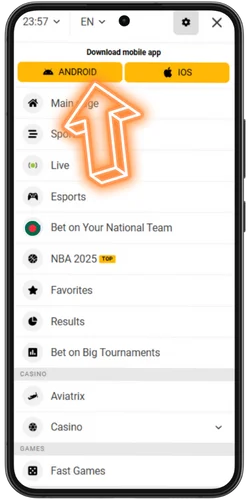
-
Download Melbet app APK:
Click the “Download for Android” button to get the latest .apk file.

-
Allow unknown sources:
In the “Install unknown apps” section, enable permission for your browser or file manager.
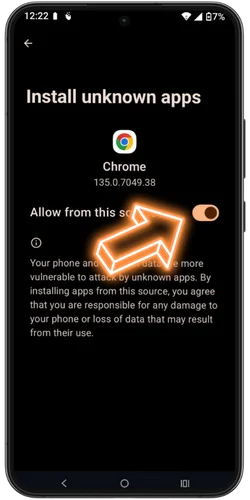
-
Install our app:
Tap the Melbet APK file to begin installation. The process takes around 10–15 seconds.
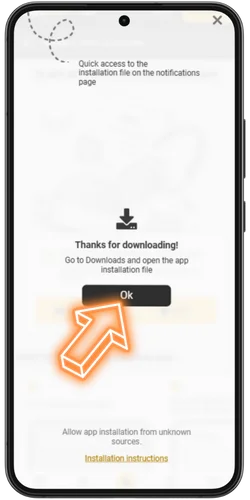
-
Launch and log in:
Open the Melbet application, enter your login details, and start using your account.

Based on internal statistics, Android users are twice as likely to complete registration within the first session compared to desktop visitors. This shows how the mobile experience is tailored for quick action and higher engagement.
System Requirements for Android
The Melbet app Bangladesh APK download is designed to run smoothly on most Android phones, including older models. Since many users complete the Melbet download APK process on devices released before 2024 our app is lightweight and optimized for stable performance. Make sure your device meets the minimum system requirements before installing:
| Parameter | Minimum Requirement |
| 📱 Android Version | 6.0 or higher |
| 💾 RAM | At least 1 GB |
| ⚙️ Processor | 1.6 GHz or faster |
| 🗂️ Free Storage | 26 MB |
| 🌐 Internet | 3G, 4G, LTE, 5G or Wi-Fi |
We provide automatic updates. If your phone matches these specs, you’ll get full access to the latest version without delays or technical issues.
Supported Android Devices
The Melbet app download APK is designed to run smoothly on a variety of Android devices. Whether you’re using a phone or tablet, our app maintains stable performance as long as minimum system requirements are met.
| Device Type | Supported Models |
| Smartphones | Samsung Galaxy A10–A53, Redmi Note 7–12, Realme C11–C55, Poco X3/X5, Huawei Y7–Y9, Infinix Hot 10–12 and newer |
| Tablets | Samsung Galaxy Tab A7/A8, Lenovo Tab M8/M10, Huawei MediaPad T3, Xiaomi Pad 5, Realme Pad, Alcatel 3T and newer |
According to our data, over 68% of Bangladeshi users prefer using smartphones over tablets when accessing the platform. This reflects a strong mobile-first trend in the region, making the Melbet APK Android download the most convenient option for everyday betting.
Download the Melbet App for iOS – Quick Setup for iPhone and iPad
Download the Melbet iOS mobile app from the App Store in less than 2 minutes. No external files are required for installation – just stable internet access. Installation is automatic and ready to use immediately. To download our app, follow these steps:
-
Visit our website:
Go to the official Melbet homepage using Safari.

-
Access the download page:
Tap on the dedicated Melbet iOS app section. You will be automatically redirected to the App Store app.

-
Tap download:
Press the install button to begin the Melbet iOS download.

-
Install the app:
Wait for the process to finish, then launch it.

You can also scan the QR code from the official website on your PC to quickly open the download link on your iPhone or iPad. By downloading our app, you will get access to activate bonuses, make a one-click deposit and play games in demo mode. We recommend enabling push notifications to stay up to date with our updates and exclusive offers.
If the Melbet app BD is not visible in your App Store, check your Apple ID region settings and switch to a supported country if required.
System Requirements for iOS
Over 47% of Melbet app download Bangladesh sessions come from iPhones running iOS 12 to 15. Before installing ourapplication, check if your device meets the minimum technical requirements listed below:
| Parameter | Requirement |
| 📲 iOS Version | iOS 14.0 or later |
| 💾 RAM | At least 1 GB |
| ⚙️ Processor | 1.2 GHz or higher |
| 🗂️ Storage | Minimum 150 MB |
| 🌐 Internet | 3G, 4G, LTE, 5G, or Wi-Fi |
Devices that match the requirements receive updates through the App Store. This keeps the Melbet app download Bangladesh latest version stable and fully compatible with future iOS releases.
Supported iOS Devices
Most users who download Melbet app on iOS use models released after 2017. The Melbet mobile app runs smoothly on both phones and tablets. Below are supported device types and tested models:
| Device | Supported Models |
| iPhone | iPhone 8, X, XR, 11, 12, 13, 14, SE (2nd/3rd gen) |
| iPad | iPad 6–10th gen, iPad Air 3–5, iPad Pro (2018+), iPad Mini 5/6 |
| iPod Touch | iPod Touch 7th gen (iOS 11–15) |
If your device is running iOS 14 or later, the app will work without any problems. Each Melbet app update improves the performance of our app once downloaded to your iPhone, iPad or iPod.
Exclusive Mobile Bonuses from Melbet for Bangladeshi Users
In our application we offer over 29 bonuses that you can activate right now. All you need to do is register and verify your account. Below, we offer the most current offers:

List of available mobile bonuses:
- Weekly cashback in the app: Bet a minimum of 128 BDT on sports events and get 10% cashback weekly. MelBet online Bet maximum cashback amount is 12,732 BDT. To qualify, activate bonus participation in your account settings.
- Promo Code Store: Use promo code BONUS773 and exchange your bonus points for betting promo codes. Enter the Promo Code Store, choose a code, place a bet, and wait for the result. Points are deducted based on the code you choose.
- Bonus for friends: Invite others to join Melbet and earn unlimited bonuses. You’ll get rewards not only for direct referrals (level 1) but also for their referrals (level 2 and beyond). The more people join via your link, the higher your total rewards.
- Deposit series bonus: Make a deposit of at least 638 BDT and receive up to 12,745 BDT as a bonus on your 2nd, 3rd, and 4th deposits. To wager the bonus, switch to your bonus account and place 5x accumulator bets with at least 3 selections per bet and minimum odds of 1.40.
- Royal Monday: Deposit on Monday between 00:00 and 23:59 and get a 100% bonus of up to 12,745 BDT. The minimum required deposit is 638 BDT. Only one bonus per user is allowed.
- Fast Games Day: On Wednesdays, deposit at least 147 BDT and get a 100% bonus of up to 14,675 BDT. You’ll also receive 5 spins on the Lucky Wheel. This offer is valid in both the website and the Melbet app Bangladesh version.
Melbet app bonuses are a valuable addition for active users looking to increase their winnings. Before using any of these offers, we recommend carefully reading the full terms and conditions.
Welcome Bonus: Up to ৳446 000
We offer a generous welcome bonus for both sports betting and casino players. Both bonuses activate after registration and your first deposit. The conditions are simple: meet the minimum deposit and complete the wagering requirements within the specified timeframe.

🎰 MelBet Casino Welcome Bonus – up to ৳446,000 + 290 FS:
- Minimum deposit: 147 BDT.
- Bonus: 100% up to 14,675 BDT + 5 Lucky Wheel spins.
- Activation: Available only to registered users who opt into bonus offers in their account.
- Wagering: x30 in Fast Games within 24 hours of bonus credit.
- Eligibility: Only active users with daily transactions qualify.
- Excluded games: Lucky Wheel, DerbyRacing, Minesweeper, and others (full list in the T&Cs).
- Penalty: Failure to meet the requirements leads to cancellation of the bonus and all winnings.
This bonus is ideal for players who regularly use Fast Games and can meet short wagering deadlines. The bonus must be used within 24 hours of being credited.
🏟️ Sports Welcome Bonus – Up to ৳12,000 + 100%:
- Minimum deposit: 100 BDT.
- Bonus: 100% of the first deposit (e.g., 1,275 BDT → 1,275 BDT bonus).
- Wagering: 5x in accumulator bets with at least 3 events, each with minimum odds of 1.40.
- Bonus is credited: Only after phone number verification.
- Withdrawals: Not allowed until full wagering is completed.
- Partial wagering: Does not count — the full amount must be wagered.
- Bonus availability: Not in combination with other offers.
- Account settings: Users must enable ‘Take part in bonus offers’.
- Bonus validity: 30 days after registration.
- After wagering: Any remaining bonus funds are moved to the main balance.
This bonus is ideal for sports bettors who regularly place accumulator bets. However, if you fail to meet the requirements, the bonus and all winnings will be voided. Choose the bonus that matches your gaming style. Both offers provide generous limits and clear conditions, but require attention to wagering rules and deadlines.
How to Register on the Melbet App
You can complete the Melbet app download and register your account in one click. The registration process takes less than 2 minutes. To simplify the process, we offer 4 different ways to register directly through the app.

Follow these steps to register:
- Open the app: Launch the Melbet app from your home screen and tap the “Register” button.
- Choose a registration method: Select one-click, phone number, or email registration.
- Enter your personal details: Fill in your name, preferred currency, and create a password.
- Apply a promo code (optional): If you have a bonus code, you can enter it here.
- Complete the registration: Review your information and tap “Register” to finish.
- Solve the captcha: Drag the slider to complete the verification and confirm you’re not a bot.
After registering, you can immediately access deposits, place bets, and claim bonuses through the Melbet mobile app. Identity verification is not required to start using the account, but full KYC may be necessary for withdrawals.
We recommend saving your login credentials and enabling auto-fill for faster future acc
One-Click Registration

One-click registration is the most popular method among Bangladeshi users — over 70% choose this option. It’s the fastest way to create an account, taking no more than 20 seconds. After completing the download Melbet app, you can use this method to start playing instantly.
To register via one-click, provide the following:
- Select country – Bangladesh
- Choose currency – Bangladeshi Taka (BDT)
- Pick a welcome bonus – Casino, Sports, or None
- Enter a promo code (optional)
- Click ‘Register‘ and complete the captcha
Once your account is created, you’ll be able to place bets and explore all features. However, to make withdrawals, you must complete your profile information in the ‘My Account‘ section.
By Phone Number
This registration option lets you sign up using just your mobile number, simply enter it and tap Send SMS. You’ll receive a code to confirm your number and finish setting up your account.

What you need to provide:
- Country (Bangladesh)
- Mobile number (+880)
- Confirmation code from SMS
- Currency Bangladeshi Taka (BDT)
- Welcome bonus selection
- Promo code (optional)
- Consent to receive marketing offers by phone (optional checkbox)
Make sure to enter a valid phone number. It will be linked to your account and used for login, support, and important notifications.
Via Social Media
Signing up via social networks is a fast and convenient method, especially if you already use platforms like Google or Telegram. This option links your existing profile to the Melbet system, allowing you to complete registration in just a few clicks. It’s a preferred choice for many users in Bangladesh who want to skip filling out forms manually.

What you need to provide:
- Select a social media platform (Google, Telegram, or Twitter)
- Country (Bangladesh)
- Currency Bangladeshi Taka (BDT)
- Choose a welcome bonus (Casino, Sports, or None)
- Promo code (optional)
After connecting your social media account, you must also provide a valid phone number in your profile settings. This is required for full account functionality, including deposits and withdrawals.
Mobile Payment Options for Bangladesh
We offer 139 deposit methods and 78 withdrawal options tailored for users in Bangladesh. Available options include bank cards, online banking, wire transfers, e-wallets and cryptocurrencies. All transactions are processed through secure channels with a 99.9% success rate, ensuring safety and stability. There are no fees for deposits and withdrawals, at 0%. After Melbet download, you can view the full list of payment methods directly in the app.
Deposit Methods
Over 92% of users in Bangladesh prefer fast deposit methods directly from their phones. After installing the Melbet application, you get instant access to local and global payment systems with flexible limits. Each method supports instant top-ups, and most transactions complete in under 2 minutes.
| Deposit Method | Limits (Min – Max) |
| Nagad Free | 200 – 25 000 BDT |
| bKash Free | 200 – 25 000 BDT |
| Google Pay | 744.64 – 74 463.74 BDT |
| PhonePe | 446.79 – 74 463.74 BDT |
| Skrill | 736.07 – 7 360 633.91 BDT |
| UPI | 446.79 – 148 927.48 BDT |
| Airtel Pay | 446.79 – 74 463.74 BDT |
| Nexus Pay | 200 – 25 000 BDT |
| IMPS | 446.79 – 148 927.48 BDT |
| Bank Transfer | 744.64 – 148 927.48 BDT |
| Solana | min 10.00 mSOL |
| Bitcoin | min 100.00 µBTC |
| Litecoin | min 6.55 mLTC |
| Binance Coin BSC | min 1.00 mBNB |
| Stellar | min 2.13 XLM |
Withdrawal Methods
After installing the Melbet app and verifying your account, you can withdraw funds directly to your wallet or exchange without any additional steps. Below are the most popular withdrawal methods:
| Withdrawal Method | Min – Max Amount |
| PhonePe | 745.82 – 44 749.09 BDT |
| Nagad | 500 – 20 000 BDT |
| bKash | 500 – 20 000 BDT |
| Bank Transfer | 1 000 – 50 000 BDT |
| mCash | 300 – 20 000 BDT |
| ecoPayz | min 1 532.39 BDT |
| Payeer | min 1 475.91 BDT |
| TRON | 1 825.37 – 18 253 613.55 BDT |
| Bitcoin | 28 592.02 – 135 812 056.64 BDT |
| Ethereum | 5 478.23 – 23 738 948.01 BDT |
| Verge | 115.25 – 230 481.26 BDT |
| Algorand | min 384.68 BDT |
Melbet Sports Betting
The Melbet application provides access to over 1,000 sports events daily, covering both local and international competitions. You can place bets in real time, with more than 30 live markets available for most events. We also support detailed betting on specific stats like yellow cards, corners, or total runs, along with unique options like head-to-heads in individual disciplines.

Available sports and betting markets:
- 🏏 Cricket: Match Winner, Total Runs, Player Performance
- ⚽ Football: Match Winner, Over/Under, Handicap, Total Goals
- 🎾 Tennis: Match Winner, Set Winner, Handicap
- 🏀 Basketball: Match Winner, Total Points, Handicap
- 🏒 Ice Hockey: Match Winner, Total Goals, Handicap
- 🏐 Volleyball: Match Winner, Set Score, Total Points
- 🥊 Boxing: Winner, Round Bets, Method of Victory
- 🏉 Rugby: Match Winner, Total Points, Handicap
- ⚾ Baseball: Match Winner, Total Runs, Handicap
You can choose between single bets, accumulators, chains, patents, or systems. For each sport, we offer additional markets like European handicap, correct score, and team to score first. Head-to-head options are also available in sports like cycling, golf, or athletics. Before placing a bet, always check the rules and payout terms for the selected bet type.
Betting on IPL and Cricket
Cricket is the most followed sport in Bangladesh, with millions watching both national and international leagues. One of the most bet-on competitions is the Indian Premier League (IPL). The tournament includes 10 teams, representing major Indian cities, and is played in a round-robin format followed by playoffs and a final. Matches are fast-paced, and each team plays 14 league games before the top four advance. Through the Melbet app BD, you can place real-time bets across every phase of the IPL season.

Popular MelBet Cricket Betting markets available in the app:
- Match Winner
- Total Runs Over/Under
- Player Performance (Runs, Wickets)
- Man of the Match
- First Wicket Method
- Total Fours / Sixes
- Team to Score First
- Top Batsman / Bowler
- Toss Winner
- Live Over-by-Over Betting
Odds for IPL bets vary by market. For example, Match Winner markets offer odds from 1.65 to 2.30, while Top Batsman selections range from 4.00 to 9.50. Live markets such as Next Over Total Runs can shift every ball, with dynamic odds starting from 1.85. These numbers help you make data-driven decisions and spot value opportunities during the match.
Other Popular Sports
Besides traditional competitions, we offer fast-paced betting options in virtual sports and eSports. These categories attract users who want immediate results or enjoy competitive digital events. With over 5,000 virtual events daily and odds reaching 15.00 in some eSports markets, the variety is unmatched.

What you can bet on:
- eSports (CS 2, Dota 2, 16+ titles): Match winner, totals, handicap, in-play events
- Virtual football: Match winner, exact score, first team to score
- Virtual basketball: Totals, handicap, first team to score
- Virtual horse & greyhound racing: Race winner, finish position, number in top 3
- Virtual tennis: Set score, match winner, first set winner
- Virtual speedway: Race winner, handicap, number of riders in top positions
These formats offer a different kind of betting experience. With events starting every 2–3 minutes, you never wait long between bets, and odds remain competitive across all markets.
Live Betting
The Live section in the Melbet app features over 900 events daily across cricket, football, tennis, basketball, and more. You can filter matches by sport, time period (1st or 2nd half), or view only those with live streams. The Multi-LIVE function allows tracking several matches at once, while “Bet on Your National Team” filters local options instantly.

Each event supports quick access to live odds, detailed scoreboards, and a responsive bet slip with One-Click Bet functionality. Most events offer 30+ live markets, including totals, handicaps, and in-play outcomes. Bets can be placed instantly without refreshing the page, and all changes in odds are reflected in real time.
Melbet Casino on Mobile Devices
Our app gives access to over 3,000 games from 167 providers, including NetEnt, Pragmatic Play, Red Tiger, and others. You can filter content by collections (6 types) like popular, new, 3D slots, and special picks, or browse by themes (12 total) such as horror, Egypt, fruits, or animals. Sorting options like Recent and Favorites make navigation faster, while categories are split into Casino, Fast Games, and Live Casino.
Melbet Casino app supports 14 game mechanics including Megaways, Hold & Win, and Avalanche, plus 4 features like Buy Bonus and Jackpot. Each title shows its RTP so you can estimate the expected return over time. The Live Casino section includes real dealers who speak 12 languages, including English and Bengali. Streaming is available in HD and 4K quality, providing a realistic experience with minimal delay and full-screen support on mobile. Whether you prefer classic slots, live tables, or themed experiences, our structure ensures that everything is grouped and searchable without distractions.
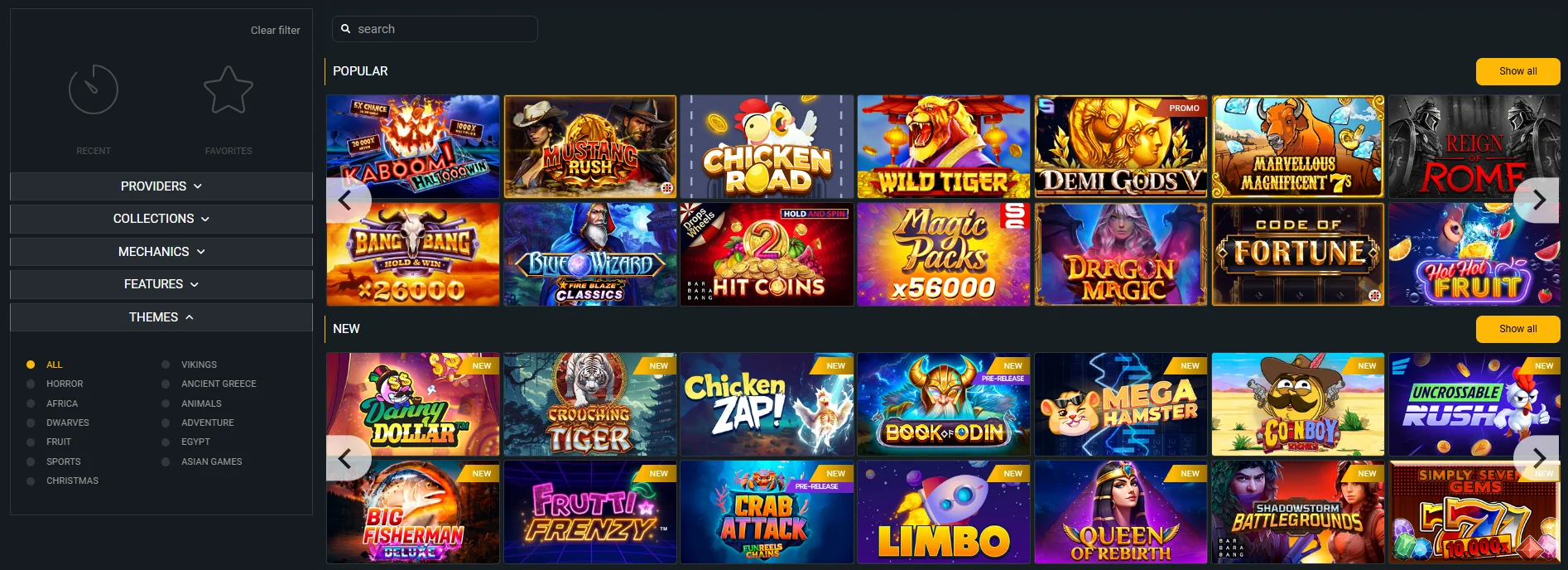
Top Casino Games
Melbet Casino offers a wide selection of slots and crash games with different mechanics and limits. Based on the results of the last 2 months, we have identified 5 leaders who are consistently in the top in terms of the number of launches, bets and payouts. You can find these games below:

- Mustang Rush: A classic video slot by Mancala Gaming. This is a 5-reel, 3-row slot with 20 fixed paylines. Wins are paid from left to right. It comes with a 95% RTP. Minimum bet: 2.00 BDT. Maximum bet: 25,000.00 BDT. Ideal for fans of straightforward gameplay and moderate volatility.
- Chicken Road: A high-risk, dynamic slot by Inout 3. Players progress through stages, with each level offering bigger rewards. RTP: 98%. Bet range: 0.95 to 6,068.65 BDT. Max win per spin: 1,213,730 BDT. High volatility with high potential returns.
- Wild Tiger: A customizable slot from BGaming. You can choose the number of active paylines: 20, 40, 60, 80, or 100. RTP: 97.16%. Total bet amount is set using the “Total Bet” field. The higher the stake, the greater the possible win. Suited for players who like to control the game’s risk level.
- Limbo: A fast-paced multiplier game by iMom. Unlike slots, this is a crash-style game where you set a target multiplier and win if the result meets or exceeds it. RTP: 98%. Bet limits range from 12 to 12,000 BDT. Max payout: 12,000,000 BDT. Perfect for players seeking quick outcomes and high returns.
- Reign of Rome: A historical slot by Hacksaw Gaming. Set in Ancient Rome, this 5×5 grid slot offers engaging mechanics and multiple game modes. RTP: 96.3%. The max win is 15,000x your stake. A great pick for those looking for immersive visuals with big payout opportunities.
These games show the best results in terms of spin frequency and payouts. They combine simple mechanics with high profit potential. Join us and start winning real prizes.
Differences Between the Melbet App and Mobile Website

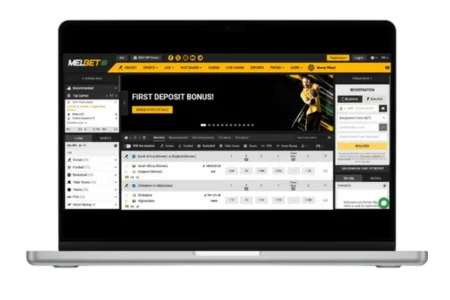
The Melbet app and the mobile website both allow access to sports betting and casino features, but they serve different user needs. While our app provides better speed and performance, the browser version requires no installation. Here’s a detailed comparison to help you choose the best option:
| Feature | Melbet App | Mobile Website |
| Speed & Performance | Faster loading, smoother animations | May lag on older devices |
| Offline Access | Can launch instantly after installation | Requires stable internet every time |
| Notifications | Push notifications for bets, bonuses, updates | No real-time notifications |
| Storage Usage | Takes up device memory | Uses browser only, no app storage required |
| Updates | Manual or automatic via app store | Always up to date without action |
| Battery Consumption | Slightly higher on older phones | Lower, depends on browser use |
| User Interface (UI) | Optimized for gestures and native navigation | Depends on browser rendering |
| Access Restrictions | Sometimes restricted in app stores | Always accessible via any browser |
| Security | Encrypted with app-level device protection | Secured via HTTPS protocol |
Our app is ideal for users who want a faster and more stable experience with features like push notifications and gesture-based navigation. The mobile site, on the other hand, is better for those who prefer not to install anything and value universal browser access without updates.

Melbet App Screenshots
Our app features a user-friendly interface with clear navigation across sports, casino, and account sections. You can switch between light and dark modes depending on preference. Key actions like placing bets, filtering games, and accessing promotions are optimized for quick interaction on both iOS and Android devices. Below you can see our interface:

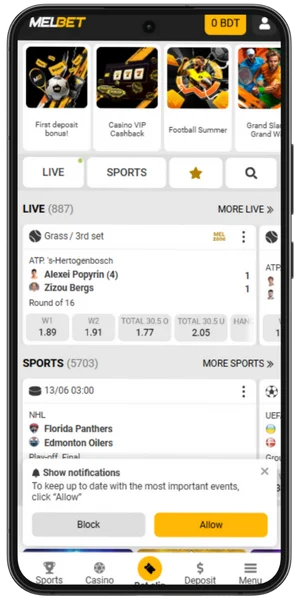
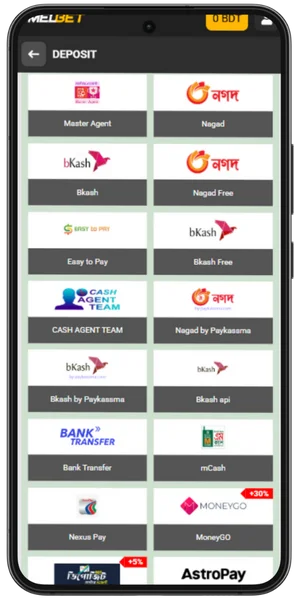

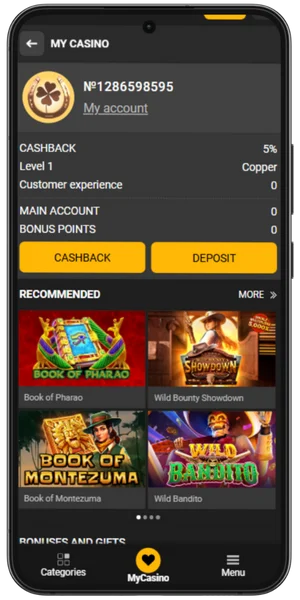

Is the Melbet App Legal in Bangladesh?
Melbet is a legal app in Bangladesh and operates under a Curacao license number 8048/JAZ2020-060. This allows you to freely download, install, and use the sports and casino betting app within the country.

Key points about Melbet’s legality and safety in Bangladesh:
- All transactions are encrypted with 256-bit SSL certificates, ensuring the security of personal and payment data.
- The company undergoes annual audits to meet licensing and security standards.
- Players have access to responsible gambling tools, including deposit limits and self-exclusion features.
- Customer support is available 24/7, with agents fluent in Bengali.
- Our app complies with GDPR and international KYC/AML protocols, reducing the risk of fraud.
Melbet aplication is a reliable option for Bangladeshi users due to its legal foundation, technical safeguards, and adherence to international gambling standards.
Melbet Support for Bangladeshi Users
We offer 24/7 support. If you have any problems accessing your account, betting coupons, bonus activation or verification, our support team is ready to help. Response times vary depending on the method you choose, but most requests are resolved within a few hours.

Here are the main contact options:
- Callback request: Leave your number, and a support agent will call you back.
- Live chat: Use the on-site messenger for fast replies in real time.
- Support form: Submit a message via the help section with a full description of the problem.
- Email: Contact the team by email for non-urgent or detailed questions.
Always include a clear explanation and, if necessary, a screenshot to speed up the process. Use our support channels in the app, where requests are tracked and assigned automatically to the next available agent.
